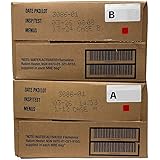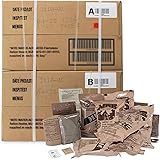Understanding the Importance of Preparedness
The Reality of Food Shortages
When I think about food shortages, it can be pretty daunting. Just envisioning empty shelves or the panic that ensues when people realize their favorite items aren’t available anymore really puts things into perspective. It’s not just about scarcity, but it’s also about the implications this has on our day-to-day life. Those who are unprepared can really feel the pinch.
Food shortages can stem from a multitude of issues—natural disasters, economic downturns, or even global pandemics. These scenarios can disrupt supply chains and leave folks scrambling to find essentials. It’s a chaotic image, but one that we need to take seriously!
Having a plan isn’t just a luxury; it’s an essential part of being a responsible adult. You wouldn’t drive a car without knowing how to steer, right? Similarly, you shouldn’t navigate today’s food landscape without a solid strategy in place.
Financial Strain of Not Planning
Budgeting for the Unexpected
Let’s face it: if food shortages hit and you’re unprepared, your wallet’s gonna take a hit! When I found myself in a bind the last time there was a shortage, the inflated prices of basic goods shocked me. I realized that not having a safety net in terms of food was costing me more than I anticipated.
Without a planning, you could end up scrambling for the last can of beans at whatever store you can find, and trust me—the price will likely be much higher than you’d normally pay. If budgeting was tight before, it’s going to get even tighter.
Planning allows you the freedom to buy in bulk, take advantage of sales, and ultimately save those precious dollars for situations where they truly matter. So, the sooner you can start factoring in food preparedness into your financial planning, the better off you’ll be!
Health Risks of Panic Buying
Unhealthy Choices Under Pressure
During my own experiences with shortages, I realized that panic buying often leads to some pretty unhealthy choices. Not knowing where the next meal is coming from can make folks grab whatever they can find—often junk food or items with little nutritional value.
This doesn’t just affect our bodies; it can spiral into mental health issues too! Stress eating combined with a lack of proper nutrition can lead to fatigue and a slew of medical problems. If you have a plan, you can make smarter, healthier choices even in chaotic times.
== > What if ... Get a FREE Subscription to PREPARE
So, focus on being proactive instead of reactive. Stocking up on nutritious foods ahead of time doesn’t just safeguard your health, it can also provide peace of mind when the world feels unpredictable.
Community Impact During Shortages
Strengthening Local Resilience
When food shortages occur, they don’t just impact individuals—they ripple through communities. If I’ve learned anything from previous shortages, it’s that those who plan can help bolster their communities. Prepared individuals can share resources, organize food swaps, or lend a hand to neighbors in need.
But without a plan, people can become isolated, leading to competition instead of collaboration. That can fracture a community at its core. I remember a time when my community rallied together during a shortage and we shared our supplies—it was a great reminder of how much stronger we are together.
Taking the time to prepare means you can contribute positively to your community throughout tough times. A resilient community benefits everyone, so consider your preparations not just as personal, but as a means to help others too.
The Psychological Toll of Unpreparedness
Managing Anxiety
The feeling of fear that comes from uncertainty can be overwhelming. Personally, I can attest to the anxiety that creeps in when I don’t have a plan. It’s not just about food; it’s about feeling secure. When planning for potential food shortages, I find that I can reduce a lot of that stress.
Taking proactive measures—like stocking up during good times—helps me mentally prepare. It’s such a relief to know that I won’t be scrambling last minute. A well-thought-out plan is like having a safety net; it brings some comfort amid chaos.
We need to acknowledge the psychological effects of being unprepared. Embracing preparedness can contribute to peace of mind, while the lack of planning can lead to unnecessary panic and stress. Who needs that kind of negativity, right?
FAQs
1. Why should I plan for food shortages?
Planning for food shortages prepares you for unexpected events, reduces financial strain, promotes healthy eating, and strengthens community ties.
2. What are some basic steps I can take to prepare?
Start by creating a budget, investing in long-lasting food items, and connecting with your community to share resources and knowledge.
3. How can I ensure my food choices are healthy in a shortage?
By stocking up on non-perishable but nutritious items—like canned vegetables, grains, and dried legumes—you can maintain a balanced diet even in tough times.
4. What’s the best way to manage anxiety around food shortages?
Having a solid preparedness plan can significantly reduce anxiety. Knowing you have resources in place can bring peace of mind during uncertain times.
5. How can I help my community during food shortages?
Start by sharing your resources, organizing community drives, and sharing tips on food preservation and storage with your neighbors.






